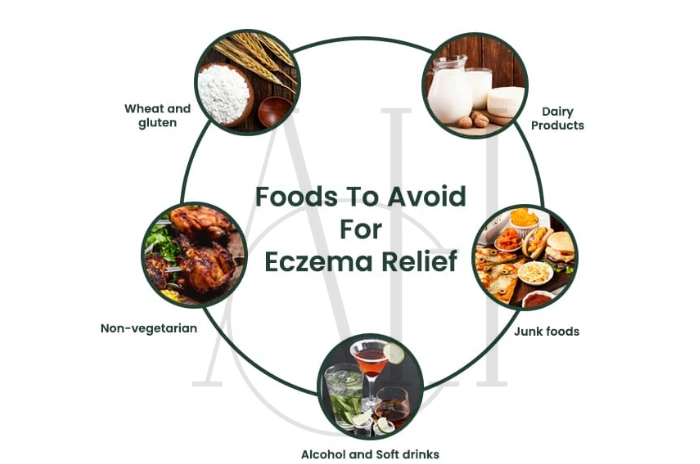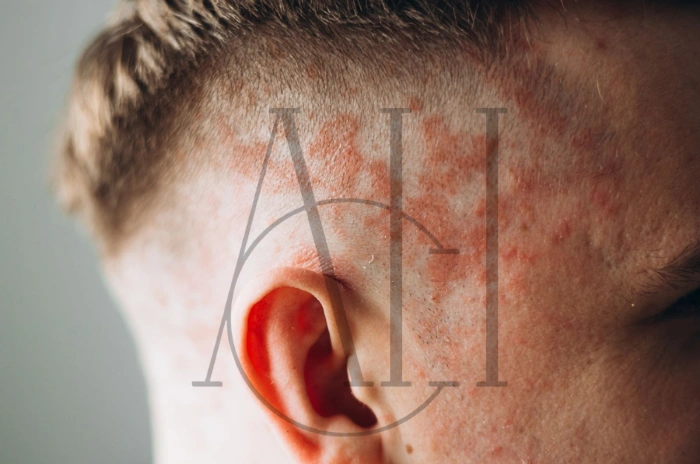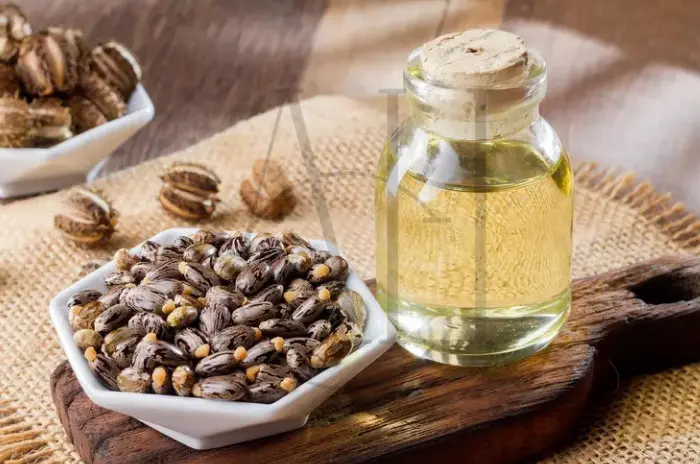Scalp eczema is a frustrating condition that affects millions of people worldwide, causing itching, flaking, and inflammation. This comprehensive guide explores proven natural remedies and effective treatments to help you manage scalp eczema symptoms and restore your scalp’s health.
Scalp eczema, also known as seborrheic dermatitis, manifests as red, scaly patches on the scalp that can be both uncomfortable and embarrassing. Understanding the underlying causes and implementing targeted natural remedies for scalp eczema can provide significant relief without harsh chemicals.
Table of Contents
ToggleHow inflammation affects the scalp
Inflammation plays a central role in scalp eczema development and progression. When the scalp’s natural barrier becomes compromised, inflammatory responses trigger the characteristic symptoms we associate with this condition.
The inflammatory process begins when irritants or allergens penetrate the scalp’s protective layer. This triggers immune system activation, releasing inflammatory mediators that cause redness, swelling, and itching. Seborrheic dermatitis specifically involves yeast overgrowth, which further amplifies inflammatory responses.
Stages of Scalp Inflammation in Eczema
| Stage | Symptoms | Duration | Severity Level |
|---|---|---|---|
| Initial | Mild itching, slight redness | 1-3 days | Low |
| Acute | Intense itching, visible flaking, inflammation | 3-7 days | Moderate |
| Chronic | Thick scales, persistent irritation, hair loss potential | Weeks to months | High |
| Recovery | Reduced symptoms, healing skin | 2-4 weeks | Decreasing |
Chronic inflammation disrupts the scalp’s natural oil production and cellular turnover process. This leads to the formation of thick, scaly patches and excessive flaking. The compromised barrier function also makes the scalp more susceptible to bacterial infections and further irritation.
Environmental factors like stress, hormonal changes, and weather conditions can intensify inflammatory responses. Understanding these triggers helps in developing comprehensive scalp eczema treatment strategies that address root causes rather than just symptoms.
Natural oils and DIY masks for soothing the scalp
Coconut oil for scalp eczema stands out as one of the most effective natural treatments available. Its antimicrobial properties help combat yeast overgrowth while providing deep moisturization to damaged skin. Apply virgin coconut oil directly to affected areas and leave for 30 minutes before gentle cleansing.
Tea tree oil for scalp eczema offers powerful antifungal and anti-inflammatory benefits. Always dilute tea tree oil with a carrier oil like jojoba or olive oil before application. Mix 5-10 drops with two tablespoons of carrier oil for safe, effective treatment.
Natural Oil Treatment Guide
| Oil Type | Dilution Ratio | Application Time | Frequency | Primary Benefits |
|---|---|---|---|---|
| Coconut Oil | Pure (no dilution) | 30-60 minutes | 2-3x weekly | Antimicrobial, moisturizing |
| Tea Tree Oil | 1:4 with carrier oil | 20-30 minutes | 2x weekly | Antifungal, anti-inflammatory |
| Argan Oil | Pure (no dilution) | 45 minutes | 2x weekly | Barrier repair, vitamin E |
| Jojoba Oil | Pure (no dilution) | Overnight | 1x weekly | Deep moisturizing, non-comedogenic |
| Lavender Oil | 1:3 with carrier oil | 20 minutes | 2x weekly | Calming, anti-inflammatory |
Argan oil provides exceptional moisturizing properties and helps restore the scalp’s natural barrier function. Its high vitamin E content promotes healing while reducing inflammation. Massage a small amount into the scalp twice weekly for best results.
Oatmeal for scalp eczema creates soothing masks that calm irritated skin. Blend colloidal oatmeal with honey and a few drops of lavender oil. This DIY mask reduces itching and provides gentle exfoliation to remove scales without causing further irritation.
A simple aloe vera and coconut oil mask combines cooling properties with deep moisturization. Mix equal parts pure aloe vera gel with melted coconut oil, apply to damp scalp, and rinse after 20 minutes.
How Apple Cider Vinegar Can Treat Scalp Eczema
Apple cider vinegar for scalp eczema works by restoring the scalp’s natural pH balance and creating an environment hostile to yeast overgrowth. Its acidic nature helps break down stubborn scales while providing antimicrobial benefits.
The acetic acid in apple cider vinegar has proven antifungal properties that specifically target Malassezia yeast, a primary contributor to seborrheic dermatitis. This targeted action helps reduce inflammation and prevents symptom recurrence.
Apple Cider Vinegar Treatment Protocol
| Dilution Strength | Skin Sensitivity | Application Method | Contact Time | Frequency |
|---|---|---|---|---|
| 1:3 (ACV:Water) | Very Sensitive | Cotton ball dabbing | 3-5 minutes | 1x weekly |
| 1:2 (ACV:Water) | Sensitive | Spray application | 5-8 minutes | 2x weekly |
| 1:1 (ACV:Water) | Normal | Direct application | 8-10 minutes | 2-3x weekly |
| 2:1 (ACV:Water) | Tolerant | Massage application | 10-15 minutes | 3x weekly |
To use apple cider vinegar safely, always dilute it with equal parts water. Apply the solution to the scalp using a spray bottle or cotton ball, focusing on affected areas. Leave for 5-10 minutes before rinsing thoroughly with cool water.
Regular use of diluted apple cider vinegar can help maintain scalp health between flare-ups. Many people find that weekly applications significantly reduce scaling and itching. However, those with sensitive skin should start with more diluted solutions and gradually increase strength.
Apple cider vinegar also helps remove product buildup that can exacerbate scalp eczema symptoms. Its clarifying properties ensure that natural oils and treatments can penetrate effectively into the skin.

Lifestyle and Diet Tips to Manage Scalp Eczema
Scalp eczema diet modifications can significantly impact symptom severity and frequency. Anti-inflammatory foods like fatty fish, leafy greens, and berries help reduce systemic inflammation that contributes to skin conditions.
Eliminating or reducing sugar intake is crucial, as excess sugar feeds yeast organisms that trigger seborrheic dermatitis flare-ups. Focus on whole foods and avoid processed items high in refined sugars and additives.
Recommended Foods vs. Foods to Avoid
| Foods to Include | Daily Serving | Foods to Avoid | Reason |
|---|---|---|---|
| Fatty Fish (salmon, mackerel) | 2-3 servings/week | Refined Sugar | Feeds yeast overgrowth |
| Leafy Greens | 2-3 cups daily | Processed Foods | Contains inflammatory additives |
| Berries (blueberries, strawberries) | 1 cup daily | Dairy Products | May trigger inflammation |
| Probiotic Foods (yogurt, kefir) | 1 serving daily | Gluten | Potential inflammatory response |
| Nuts and Seeds | 1 handful daily | Alcohol | Disrupts immune function |
| Avocado | 1/2 fruit daily | Fried Foods | Promotes inflammation |
Omega-3 fatty acids from sources like salmon, walnuts, and flaxseeds support skin barrier function and reduce inflammatory responses. Consider supplementation if dietary intake is insufficient, aiming for 1-2 grams daily.
Probiotics play a vital role in maintaining healthy gut bacteria balance, which directly impacts skin health. Include fermented foods like kefir, yogurt, and sauerkraut in your diet, or consider high-quality probiotic supplements.
Stress management is essential for scalp eczema treatment success. Practice relaxation techniques like meditation, yoga, or deep breathing exercises. Chronic stress elevates cortisol levels, which can worsen inflammatory skin conditions.
Adequate sleep supports immune system function and skin repair processes. Aim for 7-9 hours of quality sleep nightly and maintain consistent sleep schedules to optimize healing.
Effective Natural Treatments for Eczema Relief
Home remedies for scalp eczema extend beyond topical applications to include environmental modifications and holistic approaches. Creating a comprehensive treatment plan addresses multiple factors contributing to the condition.
Gentle scalp massage with natural oils improves circulation and helps distribute healing compounds throughout affected areas. Use circular motions with light pressure to avoid irritation while promoting lymphatic drainage.
Natural Treatment Effectiveness Comparison
| Treatment Method | Effectiveness Rating | Time to See Results | Cost Level | Ease of Use |
|---|---|---|---|---|
| Coconut Oil Massage | 8/10 | 1-2 weeks | Low | Very Easy |
| Tea Tree Oil Treatment | 9/10 | 3-5 days | Low | Easy |
| Apple Cider Vinegar Rinse | 7/10 | 1 week | Very Low | Easy |
| Oatmeal Masks | 6/10 | 2-3 weeks | Low | Moderate |
| Diet Modifications | 8/10 | 4-6 weeks | Variable | Challenging |
| Stress Reduction | 7/10 | 2-4 weeks | Free-Low | Moderate |
Cold compress therapy provides immediate relief from itching and inflammation. Apply a clean, damp cloth chilled in the refrigerator for 10-15 minutes to affected areas. This simple technique can interrupt itch-scratch cycles effectively.
Humidification helps maintain optimal scalp moisture levels, especially during dry seasons. Use a cool-mist humidifier in your bedroom to prevent overnight moisture loss that can worsen symptoms.
Sun exposure in moderation can benefit scalp eczema through vitamin D synthesis and mild antimicrobial effects. However, protect your scalp with light, breathable hats to prevent sunburn and further irritation.
Regular exercise supports overall health and stress reduction but requires careful attention to post-workout hygiene. Rinse your scalp promptly after sweating to prevent irritation from salt buildup.
Choosing the Right Natural Shampoo for Eczema
Best shampoo for scalp eczema selections should prioritize gentle, sulfate-free formulations that won’t strip natural oils or irritate sensitive skin. Look for products specifically designed for sensitive scalps with minimal ingredient lists.
Key ingredients to seek include zinc pyrithione, which has antifungal properties, and ketoconazole for its proven effectiveness against seborrheic dermatitis. These active ingredients target root causes while being gentler than harsh chemical alternatives.
Shampoo Ingredient Analysis
| Beneficial Ingredients | Concentration | Benefits | Ingredients to Avoid | Why to Avoid |
|---|---|---|---|---|
| Zinc Pyrithione | 1-2% | Antifungal properties | Sodium Lauryl Sulfate | Strips natural oils |
| Tea Tree Oil | 1-5% | Antimicrobial action | Parabens | Potential irritants |
| Ketoconazole | 1-2% | Treats seborrheic dermatitis | Artificial Fragrances | Allergic reactions |
| Aloe Vera | 5-10% | Soothing, anti-inflammatory | Formaldehyde | Harsh preservative |
| Salicylic Acid | 0.5-2% | Exfoliates dead skin | Alcohol Denat | Over-drying |
| Oatmeal Extract | 2-5% | Calms irritation | Synthetic Dyes | Unnecessary irritants |
Avoid shampoos containing sulfates, parabens, artificial fragrances, and dyes, as these common irritants can trigger flare-ups. Instead, choose products with natural surfactants derived from coconut or other plant sources.
Tea tree oil for scalp eczema in shampoo form provides ongoing antimicrobial benefits with regular use. Look for concentrations between 1-5% for effectiveness without excessive irritation.
Moisturizing shampoos containing ingredients like aloe vera, honey, or oatmeal help maintain scalp hydration while cleansing. These gentle formulations support barrier repair and reduce inflammation.
Frequency of washing matters significantly in scalp eczema treatment. Most people benefit from washing 2-3 times weekly to remove scales and oils without over-drying the scalp. Adjust frequency based on your specific symptoms and oil production.
FAQ :Eczema on Scalp Proven Remedies and Natural Ways to Soothe It
Can a change in diet help with eczema?
Yes, anti-inflammatory diets rich in omega-3 fatty acids and probiotics while avoiding sugar and processed foods can significantly reduce scalp eczema symptoms.
How can apple cider vinegar treat scalp eczema?
Apple cider vinegar for scalp eczema works by restoring pH balance and providing antifungal properties that combat yeast overgrowth when diluted and applied topically.
What are some natural remedies for an itchy scalp?
Natural remedies for scalp eczema include coconut oil, tea tree oil, oatmeal masks, aloe vera, and apple cider vinegar rinses for soothing irritated skin.
What is the best natural shampoo for eczema?
The best shampoo for scalp eczema should be sulfate-free with ingredients like zinc pyrithione, tea tree oil, or ketoconazole while avoiding harsh chemicals and fragrances.




